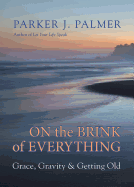
Accomplished writer, teacher, activist and former community organizer Parker J. Palmer has lived an examined life. He's been writing for the past 40 years, through nine previous books. During that time, he has shared a wide range of his experiences and the wisdom he's gained from having journeyed through many chapters and changes in his life. Palmer views his existence contemplatively at every turn, through a highly evolved, enlightened prism that blends self-examination, philosophy and wisdom gathered from a variety of literary, religious and spiritual contexts. Now in his eighth decade, he admits that he is "surprised by the fact that I like being old. Age brings diminishments, but more than a few come with benefits."
Experience and aging have certainly made Palmer a deeper, richer and more reflective human being. In On the Brink of Everything, he stands on a figurative precipice and gazes back at the full panorama of his existence--his own past, present and future--and shares what he's learned and how he perceives the beauty and dilemmas of our contemporary world. For Palmer, writing has always been his way of "collaborating with life." It is fitting then, as an essayist, poet and inspirational speaker, that he has chosen to compile his latest via a patchwork-style, multifaceted presentation that brings together, in 24 essays, a range of letters and speeches, notable quotes that have resonated with him, journal entries and poetry, including some of his own. All of these combine to enhance Palmer's reflections on the gift of aging and the importance of staying engaged, at any age, in a world that is constantly changing and often, fractured.
"We need to reframe aging as a passage of discovery and engagement, not decline and inaction," Palmer asserts, noting that his book is not a "guide to" or "handbook for" getting old. Rather, he hopes that sharing his thoughts and feelings about life and contemporary issues will offer consolation and serve as encouragement to others so that they, too, can live a more consciously evolved life.
Palmer details how On the Brink of Everything came into being. In his 70s, he felt he no longer had the energy required to devote himself to long-form writing. But when his nurturing, long-time editor--an encouraging and supportive friend--examined his work, she noticed a unifying theme: aging. Thus, this book was born.
Over seven sections, Palmer describes the formation of his professional life, activism and his interest in social causes, and how and why he became a writer. He shares his explorations of various religious disciplines and traditions, and his faith and spirituality. Using these personal foundations as a springboard, he weaves in poetic ideas about growing old with grace and wisdom. These include the importance of embracing new experiences and how multiple generations can join forces and inspire each other. He also stresses the ongoing need for enrichment--the pursuit of a life filled with purpose and work, while cultivating engagement with one's soul.
An optimist, Palmer believes that the joyful light of life cannot exist without the gloomy darkness of shadow. Therefore, he doesn't believe aging is something to be dreaded and feared, but rather welcomed. "Calamities I once lamented now appear as strong threads of a larger weave, without which the fabric of my life would be less resilient." Everything is cumulative in Palmer's world, and growth occurs through both positive and challenging experiences. Palmer shows how he continually strives to embrace human frailty, trying to remember that every instance in life can be a teachable moment. This certainly applies to Palmer's experiences battling, yet learning how to welcome, lifelong bouts of depression.
One section of the book addresses our world today and the tumult and brokenness found therein. Palmer touches upon aspects of white privilege, rampant violence, racism, sexism, homophobia, contempt for the poor and the need for all to embrace diversity. This all leads Palmer into the "rough-and-tumble world of politics" and sharing his own ideals of patriotism. Parker unabashedly voices his opinions about our 45th president, Donald Trump, whom he calls "woefully unfit for the job," and those who work in his circle. Palmer asks, "How do I stay engaged and whole when my country is under attack by an enemy that we invited in?" These passages unspool into a discourse on how politics can breed anger and wear down the physical and mental well-being of the human psyche. Palmer launches a rallying cry for multigenerations--the young and the old--to join together to resist injustice and enact change. This serves as a segue for Palmer to consider ways of finding sanctuary amid turmoil, and how grace, love and reaching deeper in faith ultimately leads to peace.
By correlating current societal disillusionment and darkness with the mystery and beauty of nature that is often "hidden in plain sight," he meditatively circles back to the idea of growing older and the promising realization that "...new life is hidden in dying.... Yet deep down... seeds of new life" are "always being silently and lavishly sown."
Palmer's prose is eloquent and philosophical. His essays are paired with themed, reflective, inspirational music that corresponds with the book--three downloadable songs written and performed by singer-songwriter Carrie Newcomer. At one point in the narrative, Palmer says that he became a writer because he was "born baffled." His inquisitive, questioning, introspective nature has been a direct result of this bafflement, leading to the carefully considered ideas he sets forth in this passionately crafted book. Palmer surely gives readers and seekers--of any age--pause and plenty of food for thought as they, too, continue to journey through their own lives. --Kathleen Gerard

